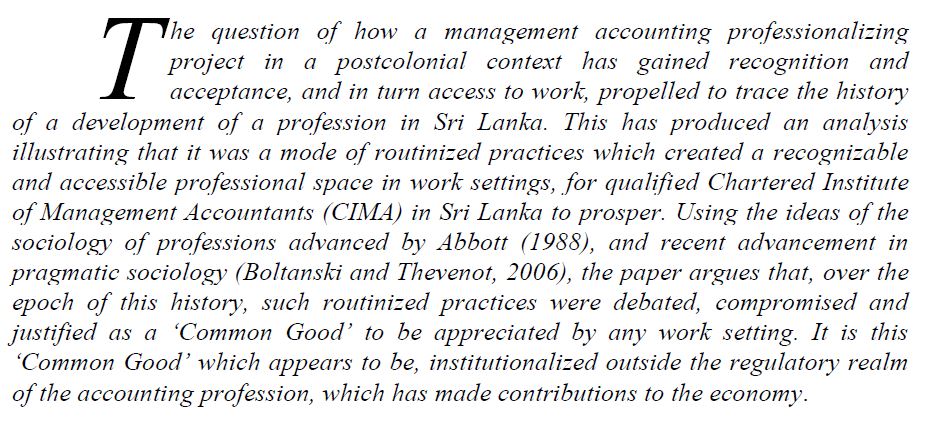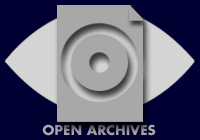THE RATIONALE OF ROUTINIZATION OF WORK : THE CASE OF CIMA IN SRILANKA
Abstract
The question of how a management accounting professionalizing project in a postcolonial context has gained recognition and acceptance, and in turn access to work, propelled to trace the history of development of a profession in Sri Lanka. This has produced an analysis illustrating that it was a mode of routinized practices which created a recognizable and accessible professional space in work settings, for qualified Chartered Institute of Management Accountants (CIMA) in Sri Lanka to prosper. Using the ideas of the sociology of professions advanced by Abbott (1988), and recent advancement in pragmatic sociology (Boltanski and Thevenot, 2006), the paper argues that, over the epoch of this history, such routinized practices were debated, compromised and justified as a ‘Common Good’ to be appreciated by any work setting. It is this ‘Common Good’ which appears to be, institutionalized outside the regulatory realm of the accounting profession, which has made contributions to the economy.
Downloads
References
Annisette, M. (2000). Imperialism and the professions: the education and certification of accountants in Trinidad and Tobago. Accounting, Organizations and Society, 25 (7), 631-659.
Annisette, M., & Kirkham, L.M. (2007). The advantages of separateness explaining the unusual profession-university link in English chartered accountancy.Critical Perspectives on Accounting, 18 (1), 1-30.
Annisette, M., & Richardson, A.J. (2011). Justification and accounting: applying sociology of worth to accounting research.Accounting, Auditing & Accountability Journal, 24 (2), pp.229-249.
Annisette, M., & Trivedi, V.U. (2013). Globalization, paradox, and the (un) making of identities: immigrant chartered accountants of India in Canada. Accounting, Organizations and Society, 38 (1), pp.1-29.
Armstrong, P. (1993). Professional knowledge and social mobility: post-war changes in the knowledge-base of management accounting. Work, Employment & Society, 7 (1), 1-21.
Armstrong, P., & Jones, C. (1992). The decline of operational expertise in the knowledge base of management accounting: an examination of some post-war trends in the qualifying requirements of the chartered institute of management accountants. Management Accounting Research, 3, (1), 53 – 75.
Bakre, O.M. (2005). First attempt at localizing imperial accountancy: the case of the institute of chartered accountants of Jamaica (1950 – 1970). critical perspectives on Accounting, 16, (8), 995 – 1018.
Bakre, O.M. (2006). Second attempt at localizing imperial accountancy: the case of the institute of chartered accountants of Jamaica (1970 – 1980). Critical Perspectives on Accounting, 17, (1), 1-28.
Bakre, O.M. (2008). Financial reporting as a technology that supports and sustains imperial expansion, maintenance, and control in the colonial and post-colonial globalization: the case of the Jamaican economy. Critical Perspectives on Accounting, 19, (4), 487 - 522.
Berry, A.J., Capps, T., Cooper, D., Ferguson, P., Hopper, T., & Lowe, E.A. (1985). Management control in an area of the NCB: rationales of accounting practices in a public enterprise. Accounting, Organizations and Society, 10 (1), 3-28.
Boltanski, L., &Thevenot, L. (2006). On justification economies of worth. New Jersey, US: PrincetonUniversity Press.
Burns, J., &Scapens, R. (2000). Conceptualizing management accounting change: an institutional framework. Management Accounting Research, 11 (1), 3-25.
Caramanis, C.V. (2002). The interplay between professional groups, the state and supranational agents: Pax Americana in the age of globalization. Accounting, Organizations and Society, 27, (4-5), 379 – 408.
Chua, W.F., &Poullaos, C. (1998). The dynamics of closure amidst the construction of market, profession, empire, and nationhood: a historical analysis of an Australian accounting association 1886 – 1903. Accounting, Organizations and Society, 23 (2), 155 – 187.
Chua, W.F., &Poullaos, C. (2002). The empire strikes back? an exploration of center-periphery interaction between the ICAEW and accounting associations in the self-governing colonies of Australia, Canada, and South Africa 1880-1907. Accounting, Organizations and Society, 27 (4/5), 409-445.
De Silva, C.R. (1987). Formation of the ruling party. New Delhi, India: Vikas Publishing House.
De Silva, K.M. (2005). A history of Sri Lanka. New Delhi, India: Penguin Books.
Don-Peter, W.L.A. (1987). Viewpoints on education in Sri Lanka. Colombo, Sri Lanka: Local Press.
Edwards, J.R., Anderson, M., & Chandler, R.A. (2007). Claiming a jurisdiction for the public accountant in England prior to organizational fusion. Accounting, Organizations and Society, 32, (1-2), 61 - 100.
Freidson, E. (1975). Profession of medicine. New York, US: Dodd Mead & Co.
Gallhofer, S., Haslam, J., &Kamla, R. (2011). The accountancy profession and the ambiguities of globalization in a post-colonial, Middle Eastern, and Islamic context: perceptions of accountants in Syria’. Critical Perspectives on Accounting, 22, (4), 376 – 395.
Golden-Bindle, K., & Locke, K. (1993). Appealing works: an investigation of how ethnographic texts convince. Organization Science, 4, (4), 595-616.
Goode, W.J. (1957). Community within a community: the professions. American Sociological Review, 22, 194-200.
Hopper, T., & Macintosh, N. (1993). Management accounting as disciplinary practice: the case of ITT under Harold Green. Management Accounting Research, 4 (3), 181 – 216.
Hopper, T., Tsamenyi, M., Uddin, S., &Wickramasinghe, D. (2009). Management accounting in less developed countries: what is known and needs knowing. Accounting, Auditing, & Accountability Journal. 27 (3), 469-514.
Jayawardane, V.K. (2000). Nobodies to somebodies: the rise of the colonial bourgeoisie in Sri Lanka. Colombo, Sri Lanka: Social Scientist Association &Sanjiva Books.
Jeyaratname, W.A. (1979). Politics in Sri Lanka 1947 – 1979. London, UK: Macmillan.
Johnson, T.J., &Caygill, M. (1971). The development of accountancy links in the commonwealth. Accounting and Business Research, (Spring), 155 – 173.
Johnson, T.J. (1972). Professions and power. London, UK: Macmillan Press.
Kelegama, S. (2006). Development Under Stress Sri Lankan Economy in Transition. New Delhi, India: Sage Publication.
Larson, M.S. (1977). The rise of professionalism in a sociological analysis, London, UK: University of California Press.
Lee, T. (1995). The professionalization of accountancy: a history of protecting the public interest in a self-interested way. Accounting, Auditing, & Accountability Journal, 8 (4), 48 - 69.
Loft, A. (1986). Towards a critical understanding of accounting: the case of cost accounting in the UK 1914 – 1925. Accounting, Organizations, and Society,11 (2), 137-169.
Macdonald, K.M. (1995). The sociology of the professions. London, UK: Sage.
Mihret, D.G., James, K., Mula, J.M. (2012). Accounting professionalization amidst alternating state ideology in Ethiopia. Accounting, Auditing & Accountability Journal, 25, (7), 1206-1233.
Miller, P., & O’Leary, T. (1994). Accounting economic citizenship and the spatial reordering of manufacture. Accounting, Organizations and Society, 19 (1), 15 – 43.
Okike, O., (2004). The response of the auditing profession in Nigeria to the challenge to its legitimacy. Accounting, Auditing & Accountability Journal,17, (5), 705-730.
Ponnambalam, S. (1981). Dependent Capitalism in Crisis. London, UK: Zed Press.
Puxty, A.G., Willmott, H.C., Cooper, D.J., and Lowe, T. (1987). Modes of regulation in advanced capitalism: locating accountancy in four countries. Accounting, Organizations and Society, 12, (3), 273-291.
Richardson, A.J. (1989). Corporatism and inter-professional hegemony: a study of regulations and internal social order. Accounting, Organizations, and Society, 14 (5-6), 415-431.
Scapens, R.W. (2004). Doing case study research. In C. Humphrey & B. Lee (Eds.), The Real-life guide to accounting research (1st ed., pp. 257-279). Oxford, UK: Elsevier.
Sian, S. (2006). Inclusion exclusion and control: the case of the Kenyan accounting professionalization project. Accounting, Organizations and Society, 31, (3), 295 - 322.
Sian, S. (2007). Reversing exclusion: the Africanisation of accountancy in Kenya 1963 – 1970. Critical Perspectives on Accounting, 18 (7), 831-872.
Sumathipala, K.H.M. (1968). History of Education in Ceylon 1795-1965. Colombo, Sri Lanka: ThisaraPrakasakayo.
Uche, C.U. (2002). Professional accounting development in Nigeria: threats from the inside and outside. Accounting, Organizations and Society, 27, (4-5), 471 - 496.
Walker, S.P. &Shackleton, K. (1998). A ring-fenced for the profession: advancing the closure of British accountancy. Accounting, Auditing, & Accountability Journal,20 (1), 34 - 71.
Wickramasinghe, D., & Hopper, T. (2005). Political economy of management accounting: a case study of a textile mill in a traditional Sinhalese village. Critical Perspectives on Accounting, 16, (4), 473-503.
Willmott, H. (1986). Organizing the profession: a theoretical and historical examination of the development of the major accountancy bodies in the UK. Accounting, Organizations, and Society, 11, (6), 555-580.
Wiswa-Warnapala, W.A. (2001). Politics in Sri Lanka. Colombo, Sri Lanka: Chathura Press.
Wriggins, W.H. (1960). Ceylon dilemmas of a new nation. New Jersey, US: Princeton University Press.
Yapa, P.W.S. (2000). University-profession partnership in accounting education: the case of Sri Lanka. Accounting Education, 9, (3), 297 – 307.












